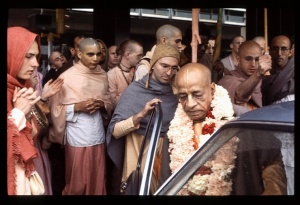SB 10.20.44: Difference between revisions
m (1 revision(s)) |
(Vanibot #0018 edit: make synonym terms in Sanskrit italic in SB - Vanisource) |
||
| Line 1: | Line 1: | ||
{{info | {{info | ||
|speaker= | |speaker=Śukadeva Gosvāmī | ||
|listener=King | |listener=King Parīkṣit | ||
}} | }} | ||
[[Category:Srimad-Bhagavatam - Canto 10 Chapter 20]] | |||
[[Category:Bhagavatam Verses Spoken by Sukadeva Gosvami - Vanisource|102044]] | |||
<div style="float:left">'''[[Srimad-Bhagavatam]] - [[SB 10|Tenth Canto]] - [[SB 10.20: The Rainy Season and Autumn in Vrndavana|Chapter 20: The Rainy Season and Autumn in Vṛndāvana]]'''</div> | |||
<div style="float:right">[[File:Go-previous.png|link=SB 10.20.43]] '''[[SB 10.20.43]] - [[SB 10.20.45]]''' [[File:Go-next.png|link=SB 10.20.45]]</div> | |||
{{RandomImage}} | |||
{{SBnotice}} | |||
==== TEXT 44 ==== | ==== TEXT 44 ==== | ||
<div | <div class="verse"> | ||
akhaṇḍa-maṇḍalo vyomni | :akhaṇḍa-maṇḍalo vyomni | ||
rarājoḍu-gaṇaiḥ śaśī | :rarājoḍu-gaṇaiḥ śaśī | ||
yathā yadu-patiḥ kṛṣṇo | :yathā yadu-patiḥ kṛṣṇo | ||
vṛṣṇi-cakrāvṛto bhuvi | :vṛṣṇi-cakrāvṛto bhuvi | ||
</div> | </div> | ||
| Line 17: | Line 22: | ||
==== SYNONYMS ==== | ==== SYNONYMS ==== | ||
<div | <div class="synonyms"> | ||
''akhaṇḍa''—unbroken; ''maṇḍalaḥ''—its sphere; ''vyomni''—in the sky; ''rarāja''—shone forth; ''uḍu-gaṇaiḥ''—along with the stars; ''śaśī''—the moon; ''yathā''—as; ''yadu-patiḥ''—the master of the Yadu dynasty; ''kṛṣṇaḥ''—Lord Kṛṣṇa; ''vṛṣṇi-cakra''—by the circle of Vṛṣṇis; ''āvṛtaḥ''—surrounded; ''bhuvi''—upon the earth. | |||
</div> | </div> | ||
{{SBcollapse}} | |||
==== TRANSLATION ==== | ==== TRANSLATION ==== | ||
<div | <div class="translation"> | ||
The full moon shone in the sky, surrounded by stars, just as Śrī Kṛṣṇa, the Lord of the Yadu dynasty, shone brilliantly on the earth, surrounded by all the Vṛṣṇis. | The full moon shone in the sky, surrounded by stars, just as Śrī Kṛṣṇa, the Lord of the Yadu dynasty, shone brilliantly on the earth, surrounded by all the Vṛṣṇis. | ||
</div> | </div> | ||
| Line 31: | Line 36: | ||
==== PURPORT ==== | ==== PURPORT ==== | ||
<div | <div class="purport"> | ||
Śrīla Sanātana Gosvāmī explains that in Vṛndāvana the full moon is eternally risen, and this full moon is like the full manifestation of the Absolute Truth, Śrī Kṛṣṇa. When He was manifest on earth, Lord Kṛṣṇa was surrounded by prominent members of the Vṛṣṇi dynasty such as Nanda, Upananda, Vasudeva and Akrūra. | Śrīla Sanātana Gosvāmī explains that in Vṛndāvana the full moon is eternally risen, and this full moon is like the full manifestation of the Absolute Truth, Śrī Kṛṣṇa. When He was manifest on earth, Lord Kṛṣṇa was surrounded by prominent members of the Vṛṣṇi dynasty such as Nanda, Upananda, Vasudeva and Akrūra. | ||
</div> | </div> | ||
__NOTOC__ | </div> | ||
</div> | |||
<div style="float:right">[[File:Go-previous.png|link=SB 10.20.43]] '''[[SB 10.20.43]] - [[SB 10.20.45]]''' [[File:Go-next.png|link=SB 10.20.45]]</div> | |||
__NOTOC__ | |||
__NOEDITSECTION__ | |||
Revision as of 13:11, 1 December 2017

A.C. Bhaktivedanta Swami Prabhupada
Please note: The synonyms, translation and purport of this verse were composed by disciples of Śrīla Prabhupāda
TEXT 44
- akhaṇḍa-maṇḍalo vyomni
- rarājoḍu-gaṇaiḥ śaśī
- yathā yadu-patiḥ kṛṣṇo
- vṛṣṇi-cakrāvṛto bhuvi
SYNONYMS
akhaṇḍa—unbroken; maṇḍalaḥ—its sphere; vyomni—in the sky; rarāja—shone forth; uḍu-gaṇaiḥ—along with the stars; śaśī—the moon; yathā—as; yadu-patiḥ—the master of the Yadu dynasty; kṛṣṇaḥ—Lord Kṛṣṇa; vṛṣṇi-cakra—by the circle of Vṛṣṇis; āvṛtaḥ—surrounded; bhuvi—upon the earth.
Translation and purport composed by disciples of Śrīla Prabhupāda
TRANSLATION
The full moon shone in the sky, surrounded by stars, just as Śrī Kṛṣṇa, the Lord of the Yadu dynasty, shone brilliantly on the earth, surrounded by all the Vṛṣṇis.
PURPORT
Śrīla Sanātana Gosvāmī explains that in Vṛndāvana the full moon is eternally risen, and this full moon is like the full manifestation of the Absolute Truth, Śrī Kṛṣṇa. When He was manifest on earth, Lord Kṛṣṇa was surrounded by prominent members of the Vṛṣṇi dynasty such as Nanda, Upananda, Vasudeva and Akrūra.